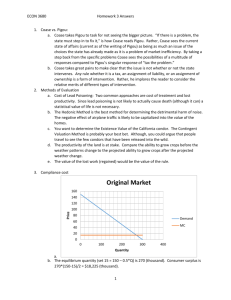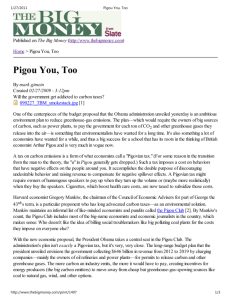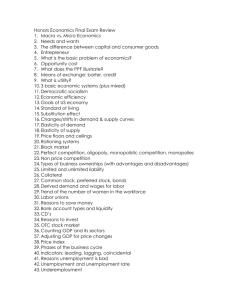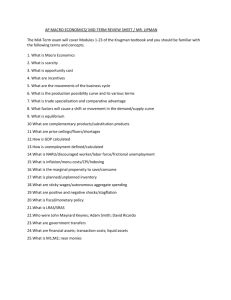Pigou, National Minimum and Unemployment:
advertisement
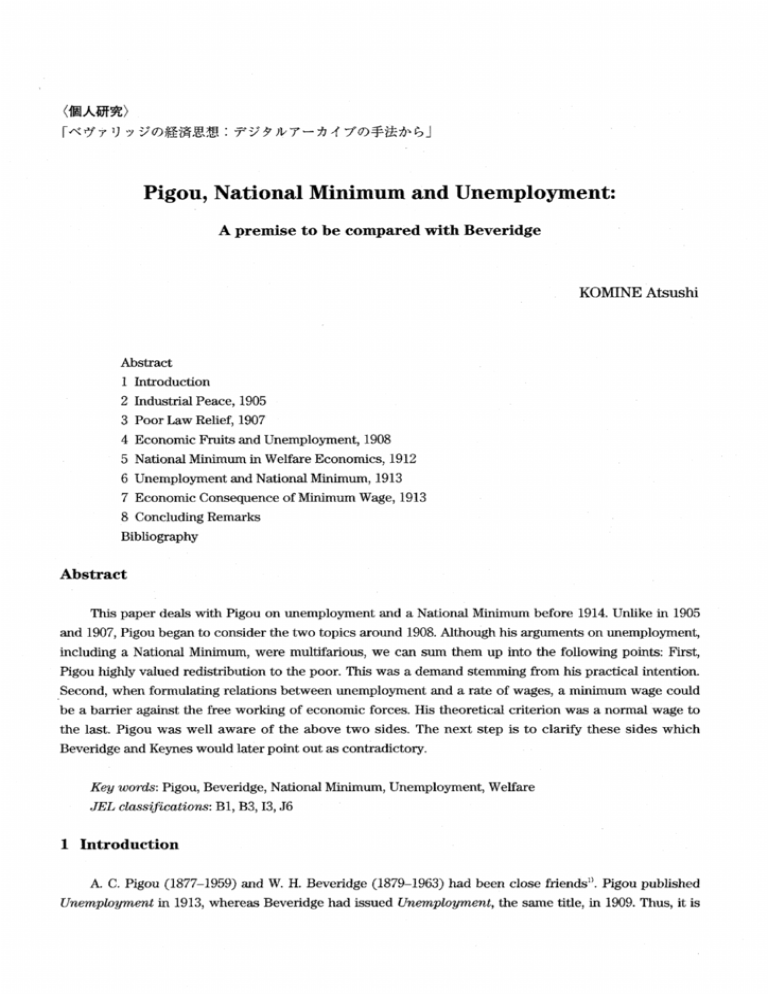
(11AiJF~)
r~ij7~7~~ft~Am:~~~N7-~1~~~~~GJ
Pigou, National Minimum and Unemployment:
A premise to be compared with Beveridge
KOMINE Atsushi
Abstract
1 Introduction
2 Industrial Peace, 1905
3 Poor Law Relief, 1907
4 Economic Fruits and Unemployment, 1908
5 National Minimum in Welfare Economics, 1912
6 Unemployment and National Minimum, 1913
7 Economic Consequence of Minimum Wage, 1913
8 Concluding Remarks
Bibliography
Abstract
This paper deals with Pigou on unemployment and a National Minimum before 1914. Unlike in 1905
and 1907, Pigou began to consider the two topics around 1908. Although his arguments on unemployment,
including a National Minimum, were multifarious, we can sum them up into the following points: First,
Pigou highly valued redistribution to the poor. This was a demand stemming from his practical intention.
Second, when formulating relations between unemployment and a rate of wages, a minimum wage could
be a barrier against the free working of economic forces. His theoretical criterion was a normal wage to
the last. Pigou was well aware of the above two sides. The next step is to clarify these sides which
Beveridge and Keynes would later point out as contradictory.
Key words: Pigou, Beveridge, National Minimum, Unemployment, Welfare
JEL classifications: B1, B3, 13, J6
1 Introduction
A C. Pigou (1877-1959) and W. H. Beveridge (1879-1963) had been close friends 1). Pigou published
Unemployment in 1913, whereas Beveridge had issued Unemployment, the same title, in 1909. Thus, it is
rather natural to attempt to investigate the personal and analytical relationship between the two economists. In addition, we will consider a certain coincidence beyond 'Economics of Unemployment'; that is to
say, we will investigate the shared recognition between the two economists that a 'National Minimum'
should be integrated with, or at least included in, a normal economic analysis.
Presently, few researchers regard Pigou as a straw-man figure, a classical economist who strove to
deny all of what J. M. Keynes (1883-1946) advocated, particularly with regard to public works2l. One studt)
reconsiders Pigou as Keynes' authentic counterpart. Another study41 re-examines Pigou' s contribution in the
tradition of the Cambridge School, and still others5> reconsider the relation between his conceptualisation
of economics and ethics, and the relation between his economic thought and a welfare state idea.
Nevertheless, a common limitation of these studies has been the tendency not only to minimise his
ideas on unemployment before 19146), but also to exaggerate the wage (mal-) adjustment function in the
labour markee). In addition, there have been no trials that have combined the problem of unemployment
with a concept of a National Minimum. It is possible to properly understand Pigou's duality (or dichotomy)
only after we investigate those early arguments.
This paper is merely provisional. We examine Pigou's arguments in chronological order, from 1905 to
1913, by restricting the theme in question to unemployment and the National Minimum. Despite having a
broader viewpoint, we will concentrate on Pigou's thoughts prior to 1914. This is a premise to compare his
theories and ideas with those of Beveridge. The paper is organised as follows. Sections 2 to 7 examine
Pigou from 1905 to 1913 with regard to unemployment and a National Minimum. Section 8 presents a brief
conclusion.
2 Industrial Peace, 1905
The Principles and Metlwds of Industrial Peace (1905) was Pigou's third book The 'labour move-
ment' at that time did not only influence the book, it also revealed hints of the typical arguments he was to
develop a few years later.
New bills were passed one after another in the 1900s to calm labour disputes such as the London
Dock Strike of 1889 and the protest against the Taff Vale case of 1901, the Unemployed Workmen Act
(1905), the Trade Disputes Act (1906), the Workmen's Compensation Act (1906), and the Trade Boards Act
(1909) s>. Thereby, Liberal Reform came. Pigou's main theme of study was affected greatly by those contemporary events. Industrial Peace means, for Pigou, an amicable settlement between employers and
employees.
Pigou admitted that this theme was fundamentally ethical (Pigou, 1905, p. 3), "what ought arbitration
and conciliation to do?" was the thematic inquiry that interested him the most. However, in most cases, he
approached the problem from an economic perspective. In other words, he would not examine the basic
ethical question of 'What is good?', as G. E. Moore ruminated and eventually abandoned any hope of
answering. Instead, Pigou declared that "we need to discover the sequence of effects to which it is likely to
lead" (p. 5). He argued that what was needed was knowledge of how given motives would operate under
given conditions by investigating actual experience. Pigou preferred 'Science' to 'Art'-a typical dichotomy.
Pigou's approach with regard to wages was to compare two hypothetical situations-wage formation
by a competitive market and wage-organised settlement by two monopolistic agents (employers and
2006 No. 37
Pigou, National Minimum and Unemployment (KOMINE)
59
employees). As Marshall did, Pigou identified 'the normal wage' with the general level of efficient wages
(p. 60) and defmed it as the wage determined by the free working of the demand and supply of labour (pp.
41-42) and as 'the centre about which oscillations caused by temporary causes ought to be regulated' (pp.
59-60). With the assumption that actual settlement of wages and the normal wage separated out, Pigou
investigated the level of wages that ought to be appropriate for each agent and the community on the
whole.
Let us examine an argument on artificially elevated wages, because it explains Pigou's general
approach to economics, i.e. the partial equilibrium approach; Pigou maintained the merits of this system
under a condition, but at the same time pointed out the demerits under another one. The question is which
condition is ultimately more important.
In a world of inequality and heterogeneity, the general welfare would be increased if money were
transferred from the rich to the poor (p. 42). This transfer, the direct effect, would engender a decrease in
satisfaction of the rich and an increase in that of the poor. Pigou, without specifying any reasons, asserted
that the decrease would exceed the gain (p. 42). Nevertheless, he justified the transfer for two reasons;
first, a pound to the rich meant less than the same sum to the poor. Second, the benefit of improved distribution would often outweigh the evil of diminished production. Pigou concluded that a raised wage above
the normal level might directly benefit the community as a whole (p. 43).
Contrary to the above argument, Pigou also considered indirect (i. e. long-run, or hypothetical)
effects. On the one hand, increased labour costs would engender a substitution of capital for it. This consequence implied that the amount of affected employment was diminished (p. 44). On the other, increased
wages could, along with external forces surely influence the quality and efficiency of labour by improving
nutrition, leisure, and so on (p. 47). However, the effect was too slow to give full play. No arbitrator could
bear the unduly high implied wage. Thus, he maintained that in guarded industries an "artificial wage may
frequently benefit the workpeople directly concerned, though it is very unlikely to increase welfare on the
whole" (p. 52).
Which effect is more significant? As far as we have investigated, Pigou made no clear statements on
this point. He merely placed the two, or more, situations equally, by changing a number of basic conditions
(the partial equilibrium approach). Nevertheless, judging by his use of the term 'normal', which strongly
implied the norm, Pigou appears to have employed an orthodox concept of several dichotomies, i.e. normal and artificial, competitive and legal, and long-run (indirect) and short-run (direct). In any case, it is
important to point out that in 1905 Pigou had neither a concept of a National Minimum nor a direct
approach to unemployment. He only had a strong concern towards actual redistribution to the poor. This
fact implies that, despite having a strong motive for poverty, Pigou had not encountered the concept of a
National Minimum and an economic analysis of unemployment.
3 Poor Law Relief, 1907
McBriar (1987), probably for the first time, devoted attention to Pigou's memorandum of 1907 submitted to the Royal Commission on the Poor Laws and Relief of Distress (1905-1909). McBriar (1987, p. 258)
concluded that neither "Pigou nor Marshall had any specific help to give the Commission on the problem
of unemployment". Even so, this memo is crucially important for at least two reasons.
First, this memo is a prototype for the welfare economics to be developed five years later. Pigou's
60
f±~f-t~liJf~i¥¥a
diagnosis included three important elements. (1) 'Well-being' was clearly defmed as dependent upon (a)
"the people themselves as ethical personalities, (b) the direct social and other relations of people with one
another, and the satisfactions that result therefrom, and (c) the satisfactions obtained by the people from
their economic circumstances" (Pigou, 1907, p. 981, para.2). It is notable that Pigou's 'welfare' includes
both ethical and economic goodness. (2) However, as usual, Pigou ignored (a) and (b) above - or perhaps
more precisely, he concentrated his attention on the third element, (c) economic satisfaction. For, "the
economic effects in short, can be roughly compared", and "if one policy is certainly superior to another in
economic effect, it is probably superior to it on the whole" (p. 982, para.4, emphasis in original). (3)
Finally, economic well-being depended upon two things, (a) the size of the national dividend, and (b) its
distribution (p. 987, para.l4). The structure comprising these three factors was almost the sarne9 ) as his
arguments in Wealth and Welfare (1912).
Second, even more important, this memo has a hint as to how Pigou dealt with a National
Minimum 10). He regarded the Poor Law system as policies "under which each person in any of the categories is guaranteed by the State a certain minimum condition of life, irrespective of his income, or of
any contribution not represented in income" (p. 991, para.25, emphasis added). Contrary to our expectations, Pigou was very bitter at the minimum guarantee system because it harmed free economic interaction. This system had three negative incentives to the economy as a whole, (1) Relieved people tended to
falsify nominal conditions such as their age, income and so on (p. 991, para.26). (2) People, expecting a
guaranteed minimum, would do less work. (3) The "temptation not to save will be very strong" (p.992,
para.27). Consequently, the national dividend would be diminished. Beyond that, Pigou supported the 'less
(reduced) -eligibility' of the 1834 system. 'Less-eligibility' means that any treatment of able-bodied paupers
should be under the situation of the independent workers of the lowest class. He agreed "that the principle
[of 1834] with respect to the able-bodiednl is still of considerable importance and ought not to be violated"
(p. 992, para.29). Furthermore, severe deterrent conditions such as disfranchisement and the stigma of
pauperism were necessary (p. 996, para.33).
Harris (1996, p. 59) evaluated Pigou's memo highly, saying "he embarked upon the immensely ambitious task of trying to construct a theoretical foundation for the policy of the 'National Minimum'." In fact,
that valuation is an overestimate. It is true that Pigou considered some type of a National Minimum.
However, confming his arguments to pauperism, he concentrated on negative incentives of the guaranteed
minimum system. What was lacking was an examination of conditions of ordinary citizens, beyond pauperism, and unemployment in industries where fluctuations prevailed.
4 Economic Fruits and Unemployment, 1908
Pigou addressed "Economic Science in relation to Practice" in 1908 when he succeeded Marshall as
Professor of Political Economy at Cambridge. This speech represents his stance not only on economics,
but also on unemployment.
Pigou distinguished between normative and positive sciences and assigned the former for ethics and
the latter for economics. Division of labour between the two existed, but when thinking of practical policies, ethics and economics should be mutually dependent (Pigou, 1908, p. 13). Social enthusiasm was the
beginning of economics. Economics was not "knowledge for the sake of knowledge, but rather ... knowledge for the healing that knowledge in some measure may help to bring" (p. 11). Given such a mission to
2006 No. 37
Pigou, National Minimum and Unemployment (KOMINE)
61
improve society, economists have an obligation to investigate what effects tended to happen, not what
ought to happen (p. 13). After comparing numerous cases, final judgement should be done with the help of
ethics. Thus, for Pigou, economics was a handmaiden to ethics (p. 14). It follows that he managed to cope
with being both a social reformer and a detached scientist, as was Marshall's mission12 J.
Pigou devoted special attention to unemployment as an example of a qualitative analysis between
causes and effects (p. 22). Although his analysis was rather concise, the contents were abundant.
Regarding unemployment, a set of definitions, causes, and remedies existed. Pigou stated,
What we mean by the problem of Unemployment ... is the fact that a number of artisans and
labourers, able to and willing to work, find themselves - and sometimes for long periods together withoutajob,and,consequently,withoutwages.(p.23)
Note that he excluded paupers, disabled persons, and lazy or voluntary workers. In that regard, he indicated three causes, associated closely with one another, the change of industrial structure, the legal enforcement of a minimum wage, and fluctuations. In Britain, the structure of wages had been changed, from
piece-wages to time-wages, from skilled artisans to unskilled labourers. On the other hand, changing
demand for labour was inevitable because of seasonal and cyclical fluctuations (p. 25). The method of coping with varying demand for labour in industries of piece-wages was to vary working hours ('short time').
Dealing with that of time-wages was to dismiss some workers; furthermore, "dismissals can be concentrated upon workmen who are abnormally expensive relative to their worth" (p. 24). Pigou pointed out that
trade unions had insisted upon a unified level of wages and did not allow departures from this standard to
correspond with the varied efficiencies of individual workers. Nowadays, the unions' action was justified
under the legal settlement of a minimum wage. However, he said,
Any action on the part of Trade Union in discouragement of reasonable piece-work arrangements, and ... any undue insistence upon rigid and inelastic standards ... are stumbling-blocks" (p.
25)
These three factors comprised the causes of prevailing unemployment. Therefore, mitigating industrial fluctuations was the first choice to adopt as a remedy for unemployment. In addition, public works were
efficacious for several reasons. Above all, "a transference of money between two groups [the rich and the
poor], even if there is some incidental loss upon the way, always increases satisfaction, and is, therefore
economically advantageous" (p. 27). Next, raising money for public works would not become futile. It
saved other monies into private charity and Poor Law relief. Finally, economists directed attention to
slowly working effects. To abolish unemployment meant to "save men from permanent demoralisation and
loss of efficiency" (p. 29).
More importantly, Pigou claimed that "questions concerning the supply of capital are less obvious,
but not less important" (p. 29). This means that an indirect (long-run) effect of unemployment on capital
was more significant than unemployment itself.
Pigou's address of 1908 was a half-way point towards deliberations regarding the problem of unemployment. He definitely took notice of unemployment as a practically urgent conundrum. Unlike his 1905
analysis, he posited that the gains accrued by the poor from redistribution directly outweighed the loss
incurred by the rich. However, it included a number of negative arguments. He did not consider a National
Minimum here; instead, he regarded the settlement of a minimum wage as being quite harmful on occasion
because even inefficient workers could unduly receive the minimum standard. In addition, Pigou attached
great importance to an indirect effect on capital (i.e. whether or not the national dividend increases).
5 National Minimum in Welfare Economics, 1912
Wealth and Welfare was published in 1912. This profound book marked the beginning of expansion
of a new area in economics, welfare economics. In the preface, Pigou declared,
Several years ago I began to study the causes of unemployment. It soon became apparent, however, that these causes are so closely interwoven with the general body of economic activity that an
isolated treatment of them is scarcely practicable. (Pigou, 1912, preface 7, emphasis added)
According to the phrase 'several years ago', we presume that he began to consider the problem of unemployment roughly after 1905 and before 1910. This period coincides with the year(s) of the Poor Law
Commission (1905-1909) and Beveridge's Book, Unemployment (1909).
Here, Pigou, as in his writings of 1905 and 1908, maintained a dual perspective on the subject, noneconomic and economic welfare. Welfare, as well as 'good', cannot be defmed exactly, but "includes states
of consciousness only, not material things or conditions" (p. 3). On the other hand, economic welfare
raised "in connection with the earning and spending of the national dividend, or, in other words, of those
parts of the community's net income" (p. 3). With regard to a connection with total and economic welfare,
he stated,
When we have ascertained the effect of any cause on economic welfare, we may ... regard this
effect as probably equivalent in direction, though not in magnitude, to the effect on total welfare. (p.
11, emphasis in original)
This optimistic judgement encouraged him to confme economic phenomena, in particular, the national
dividend.
The duality is most obvious in the discussion of a National Minimum. Pigou, for the first time, grappled squarely with the concept when he argued for the distribution of the national dividend. On the one
hand, a National Minimum was the right to live (or work) from a social or legal viewpoint. He defined it as
"conditions 13 ), below which it refuses to allow the fortunes of any citizen in any circumstances to fall" (p.
394). It was "not as a subjective minimum of satisfaction, but an objective minimum of conditions" (p.
394). The minimum was absolute and objective. It was the clear target to be combated. Although redistribution from the rich to the poor engendered a loss and a gain, this action by the state would be justified.
For, "the good of abolishing extreme want is not commensurable with any evils that may follow from the
diminution of the dividend" (p. 395, emphasis added). In other words, Pigou admitted that establishing a
National Minimum was a priority and incomparable to any other conditions14).
Yet Pigou continued by saying "our discussion cannot stop at this point" (p. 395). He answered what
the level of the National Minimum should be,
2006 No. 37
Pigou, National Minimum and Unemployment (KOMINE)
63
... economic welfare is best promoted by the establishment of a national minimum, at such a
level that the direct good resulting from the marginal pound transferred to the poor just balances the
indirect evil brought about by the consequent reduction of the dividend. (pp. 395-396, emphasis
added)
This stance is purely that of economists-of adapting marginal analysis to the problem of redistribution.
Indeed, in this passage Pigou referred to the old problem of a trade-off between equity and efficiency:
increasing equality (more redistributive situations) needs decreasing GDP, whereas increasing GDP
requires decreasing equality (less redistributive situations). Thus, it is natural for those who had received
their of the Marginal Revolution to pursue the balancing point.
Nonetheless, did Pigou secretly change the subject from a National Minimum into an Optimal
Minimum? The former requires the absolute (given) level of human needs (such as food and cloth). The
latter implies arriving at the best redistributive point, which maximised the national dividend, among movable income levels of the poor. The former belongs to a legal or social field (right to live), whereas the latter belongs to an economic one (efficiency). What impelled Pigou to identify the two concepts? Here, we
merely state that he combined the two into one simple term: the National Minimum.
6 Unemployment and National Minimum, 1913
In Unemployment (1913), Pigou tackled unemployment straight on. Though there are numerous
points at issue 15), we confme to a defmition and a National Minimum only.
Pigou's definition of unemployment is more epoch-making16) than has been thought. He said,
For unemployment clearly does not include all the idleness of wage-earners, but only that part
of it which is, from their point of view and in their existing condition at the time, involuntary.
(Pigou, 1999[1913AJ, p. 14, emphasis in original)
Several studiesm have pointed out that Pigou's meaning of 'involuntary' and that of Keynes' were definitely
different. It is true that Keynes' concept was related to insufficient effective demand from a macroeconomic point of view, whereas Pigou's was associated with personal enforcement of being unemployed.
Consequently, Pigou's conceptualisation included frictional unemployment. However, as Aslanbeigui
(1998, p. 87) points out, it was novel that unemployment was defined from a subsistence level.
Unemployment connected with social evils, such as loss of wages (Pigou, 1999[1913A], p. 30), variable
expenditure (p. 31), losing regular work habits, and self-respect (p. 32). By rendering workers' standard of
living variable, the men, "once merely unemployed, may be found to have become unemployable" (p. 33).
Pigou associated unemployment with a subsistence level18J when he said,
.... as regards grades so badly situated that the spreading of unemployment forces the earnings
of all below a reasonable subsistence minimum, concentration is better than spreading. (p. 203)
Nevertheless, again Pigou pursued an economic argument to its logical conclusion. He seemed to
identify a minimum wage (not a national minimum as a whole) with an obstacle to an efficient equilibrium.
He stated,
If ... wealth -
and, therefore the demand for labour -
were to increase, while the accepted
humanitarian minimum of wages remained the same, unemployment would necessarily diminish; and
if the humanitarian minimum rose while the community's wealth remained the same, unemployment
would necessarily increase. (p. 66)
The former case is easily understood, to increase the demand for labour directly engenders decreased
unemployment. However, the latter is rather complicated, Pigou seemed to assume that inefficient workers almost always received unduly high wages. Whereas the demand for labour was not to increase, the
supply was to increase because of an increased subsistence level. This is the Malthusian logic. The imbalance would bring about idle workers and then unemployment. Or, if the minimum increased, money raised
from the rich (taxes) should increase more and the national dividend would decrease.
Anyway, in a stationary state, unemployment is likely to be present when all workers "have to be paid
a rate of wage artificially raised above that which the free play of economic forces tends to bring about"
(p. 242). Finally Pigou declared pessimistically,
... the existence of a large body of persons not worth this minimum wage is a cause of unemployment. (p.243)
Pigou also stated that "unemployment is wholly caused by maladjustment between wage-rates and
demand" (p. 51, emphasis in original). Therefore, 'maladjustment' logically included a minimum wage. At
this point, a minimum wage is not the right to live19>, but an obstacle to a competitive equilibrium. Pigou
assumed that wages in a free market were always under a humanitarian minimum wage.
7 Economic Consequence of Minimum Wage, 1913
We take up Pigou's article, "A Minimum Wage for Agriculture" in 1913 to clarify the last point. This
paper, confronted with the establishment of a legal minimum wage by the Trade Boards Act (1909),
reveals his basic way of thinking, which is clearly in the tradition of Marshall.
Pigou differentiated between a fair wage and a living wage (Pigou, 1999[1913B], p. 42). The former,
as Marshall defmed, was the same as the normal wage, which would prevail if economic forces had perfectly free play, perfect knowledge and complete labour mobility (p. 43). The latter meant "a wage sufficient to enable the recipient of it to attain ... to a certain defmite standard of life, below which public opinion holds it unreasonable that the estate of any citizen should be allowed to fall" (p. 46).
Based on the distinction above, Pigou considered the following three cases. First, when only some
workers were paid below a fair rate, it was 'unfair' for them; therefore, the legal minimum raised to the fair
rate was beneficial. Second, even in the first case, if the supply of labour was excessive relatively to the
demand, it was natural for a worker, whose wage was under a fair one, to move into some district where
his work was more productive. At that time, "minimum wage legislation might well tum to be the reverse
of desirable" (p. 53). Third, even if a worker were paid less than a living wage, that wage might be equiva2006 No. 37
Pigou, National Minimum and Unemployment (KOMINE)
65
lent to a fair (efficient) one. In such a case, the legal enforcement of a minimum wage leads a worker to
substitute for other more productive workers. Although improved wages would engender improved efficiency, the final result would be that the "legal enforcement of a living wage in agriculture, in excess of
what ... would be the fair wage, is ... more likely to injure than to benefit agricultural labour as a whole"
(p. 57).
In conclusion, Pigou regarded a fair and normal wage as a primary necessity, whereas a living wage
has only secondary importance. In spite of admitting high wage effects, he identified a living minimum
wage with an obstacle to normal play of economic forces.
8 Concluding Remarks
Thus far we have outlined the manner in which Pigou's ideas on unemployment and the National
Minimum were formulated in his early writings between 1905 and 1913. His manner of thinking was meticulous and extended from a myriad of viewpoints. Occasionally he made the witty remark that economies
were too complex to plainly summarise. Despite his claim, we can extract his basic or typical ways of
thinking into the following two points.
First, Pigou highly valued redistribution to the poor. He emphasised the importance of vertical equality, i.e. the improvement of the labour class as a whole 20). This was a demand that stemmed from his practical intention and his ethical background. As far as this aspect was concerned, Pigou employed the concept
of a National Minimum-the right to live for each citizen, which must be guaranteed at least up to the subsistence level.
Second, Pigou also attempted to formulate relations between unemployment and a rate of wages in
the labour market. In this case, a minimum wage, one element of a National Minimum, could mostly prove
to be a barrier against the free working of economic forces. He adopted the dichotomies of long-run and
short-run and normal and artificial. His theoretical criterion was a normal wage to the last. Markets could
be incomplete because of maladjustment of prices, wages, and interests.
In Pigou's consciousness, a deep split exists between an actual recommended policfu -or, an ethical
request-and an ultimate proposition in economics. He appears to have often selected his existence as an
orthodox classical economist. Or, at least, he had pessimistically suffered from the split between the two
positions. For Pigou, the National Minimum was an uncomfortable necessity of actual economic life,
mixed in with theoretical models and non-economic welfare. On the one hand, he maintained the Marshall
tradition (normal wages and economic chivalry) in the long run. On the other hand, guided by an enthusiastic mission, he pursued feasible benefits in the short run. Pigou grappled with the difficult problem,
between economic dealings with poverty (and unemployment) and the National Minimum, and settled for
its co-existence in his economics. Keynes would later point out this situation as a contradiction.
The next step to consider is to compare this conclusion with Beveridge's arguments in the 1900s and
1910s. This project will ascertain reciprocal intellectual influences, which will also point towards a long
history of unemployment economics in Britain.
Bibliography
(A) Pigou's Writings
Pigou, A. C. 1999[1905]. Principles and Methods of Industrial Peace, in D. Collard (ed.) A. C. Pigou Collected Economic
Writings, Volume 1, London, Macmillan
Pigou, A.C. 1910[1907]. Memorandum on Some Economic Aspect and Effects of Poor Law Relief, 981-1000, in Appendix,
Volume 9, Minutes of Evidence, Royal Commission on the Poor Laws and Relief of Distress, Cd. 5068, London, His
Majesty of Stationary Office and Wyman & Sons. Ltd.
Pigou, A. C. 1908. Economic Science in Relation to Practice: An Inaugural Lecture given at Cambridge, 30th October,
1908, London: Macmillan.
Pigou, A. C. 1999[1912]. Wealth and Welfare, D. Collard (ed.) A. C. Pigou Collected Economic Writings, vol. 2, London,
Macmillan
Pigou, A. C. 1999[1913A]. Unemployment, D. Collard (ed.) A. C. Pigou Collected Economic Writings, vol. 4, London,
Macmillan
Pigou, A. C. 1999[1913B]. A Minimum Wage for Agriculture, 41-58, in Essays in Applied Economics, D. Collard (ed.) A.
C. Pigou Collected Economic Writings, vol. 5, London, Macmillan
Pigou, A. C. 1999[1913C]. Employers and Economic Chivalry, 12-23, in Essays in Applied Economics, D. Collard (ed.)
A. C. Pigou Collected Economic Writings, vol. 5, London, Macmillan
Pigou, A. C. 1999[1920]. Economics of Welfare, the fourth edition, D. Collard (ed.) A. C. Pigou Collected Economic
Writings, vol. 3, London, Macmillan
Pigou, A. C. 1930. Unemployment Policy, The Times, 6 June 1930
(B) Beveridge's Writings
The Beveridge Papers, in the Archive Section, British Library of Political Science, London School of Economics and
Political Science.
Beveridge, W. H. 1909. Unemployment, A Problem of Industry, London, Longmans, Green and Co.
(C) Other Writings
Ambrosi, G.· M. 2003. Keynes, Pigou and Cambridge Keynesians, Authenticity and Analytical Perspective in the
· Keynes-Classics Debate, New York, Palgrave Macmillan
Aslanbeigui, N. 1989. Marshall's and Pigou's Policy Prescriptions on Unemployment, Socialism and Inequality, 191-204,
in D. A. Walker (ed.) Perspectives on the History of Economic Thought, vol. 1, Classical and Neoclassical Economic
Thought, Aldershot Hants; UK, Edward Elgar
Aslanbeigui, N. 1992. Pigou's Inconsistencies or Keynes's Misconceptions? History of Political Economy, vol. 24, no. 2,
413-433
Aslanbeigui, N. 1998. Unemployment through the Eyes of a Classic, 85-99, in J. C. W. Ahiakpor (ed.) Keynes and the
Classics Reconsidered, London, Kluwer Academic Publishers
Brady, M. E. 1994. A Note on the Keynes-Pigou Controversy, History of Political Economy, vol. 26, no. 4, 697-705
Casson, M. 1983. Economics of Unemployment, An Historical Perspective, Oxford, Martin Robertson
Collard, D. 1981. A. C. Pigou, 1877-1959, in D.P. O'Brien and J. R.
Presley (eds.), Pioneers of Modern Economics in
Britain, London, Macmillan
Collard, D. 1996. Pigou and Future Generations, A Cambridge Tradition, Cambridge Journal of Economics, vol. 20, no.
6, 585-597
Collard, D. 1999. Introduction, preface 5-48, in D. Collard (ed.) A. C. Pigou Collected Economic Writings, voL 1, London,
Macmillan
Cottrell, A. 1944. Brady on Pigou and Keynes: Comment, History of Political Economy, vol. 26, no. 4, 707-711.
Flatau, P. 1997. Fair Wages and Just Outcomes: Marshall and Pigou on the Labour Market and Redistribution, History of
Economics Review, no. 26, 109-124.
Garraty, J.A. 1978. Unemployment in History, Economic Thought and Public Policy, New York, Harper & Row,
Publishers
Groenewegen, P. 1995. A Soaring Eagle, Alfred MarshaU 1842-1924, Hants; UK, Edward Elgar
Harris, J. 1996. From Sunspots to Social Welfare, the Unemployment Problem 1870-1914, 52-68, in B. Corry (ed.)
Unemployment and the Economists, Cheltenham; UK, Edward Elgar
Hatton, T. J. 1997. Trade Boards and minimum wages, 1909-39, Economic Affairs, vol. 17, no. 2, 22-8.
2006 No. 37
Pigou, National Minimum and Unemployment (KOMlNE)
67
Hayasaka, T. 1983. Keynes' Economic Thought, Theory and Policy, in Chapter 2 of Hayasaka (ed.) Re-examination of a
Kenysianism, Tokyo, Taga-Syuppan (in Japanese, titles are our translation)
Hongo, R. 2001. A C. Pigou as a Pioneer ofWelfarism, (in Japanese with an English summary), Annals of the Society for
the History of Economic Thought, no. 39, 116-127
Hutchison, T. W. 1953. A Review of Economic Doctrines, Oxford, Oxford University Press
Keynes, J. M. 1973. The Collected Writings of John Maynard Keynes, Vol.14, The General Theory and After, Part 2,
Defence and Development, London, Macmillan, for the Royal Economic Society
Komine, A. 2001. Contemporary Unemployment [1909], Beveridge's First Programme, Niigata Sangyo University
Discussion Paper Series, no. 22, October 2001
Komine, A. 2002. Beveridge on Unemployment in 1909, Three Inflows and Outflows, Bulletin of Niigata Sangyo
University Faculty of Economics, no. 25, 27-49
Komine, A 2004. The Making of Beveridge's Unemployment [1909],There Concepts Blended, The European Journal of
the History ojEconomic Thought, vol. 11, no. 2, Summer 2004,255-280
Maloney, J. 1985. Marshall, Orthodoxy and the Professionalisation of Economics, Cambridge, Cambridge University
Press
McBriar, A.M. 1966. Fabian Socialism and English Politics 1884-1918, Cambridge, Cambridge University Press
McBriar, A.M. 1987. An Edwardian Mixed Doubles, The Bosanquets versus the Webbs, A Study in British Social
Policy 1890-1929, Oxford, Clarendon Press
Shionoya, Y. 1993. A Non-Utilitarian Interpretation of Pigou's Welfare Economics, in P. Koslowski andY. Shionoya
(eds.) The Good and the Economical, Berlin, Springer-Verlag
Webb, S. & B. 1898[1897] Industrial Democracy, the Second Edition, London, Longmans, Green and Co.
Winch, D. 1969. Economics and Policy, A Historical Study, London, Hodder and Stoughton
Yamazaki, S. 2003. The Structure of Pigou's Ideal Utilitarianism and Welfare Economics, (in Japanese with an English
summary), Annals of the Society for the History of Economic Thought, no. 43, 38-51
Notes
*
An earlier draft was presented at the conference of 'Cambridge School of Economics: Welfare Economics and the
Welfare State' (Feb 2005, Hitotsubashi Univ., Japan). We are grateful to Roger Backhouse, Mauro Boianovsky, Peter
Groenewegen, Omar Hamouda, Christina Marcuzzo and Roger Middleton for their valuable comments. This research
was supported by grants from both Ryukoku University Research Institute for Social Sciences (2006) and JSPS. KAKENHI (17530158).
1 ) The Beveridge Papers include at least 11 pieces of correspondence from 1925 to 1941, including letters regarding
personnel affairs, inquiry about Pigou's heart disease and congratulations offered upon becoming a member of a committee. The Beveridge Papers are stored in the Archive Section, British Library of Political Science, London School of
Economics and Political Science (hereafter, BP), BP II b. See also Komine (2002, p. 40).
2) Hutchison (1953, p. 416) is the earliest to try to resolve those misunderstandings. In Japan, Hayasaka (1983, pp.
44-52) is eager to correct it.
3 ) See Ambrosi (2003) and Aslanbeigui (1998).
4 ) Aslanbeigui (1989) distinguishes Marshall from Pigou.
5 ) For example, see Shionoya (1993), Hongo (2001), and Yamazaki (2003).
6) Aslanbeigui (1989, p. 142) claims that Pigou's ideas were natural consequence of the turbulent inter-war period.
Our claim is to extend the trace to before 1914. Maloney (1985, ch.11) exceptionally handles Pigou's early writings.
Backhouse (1985, pp. 246-249) takes up unemployment policy before 1914.
7) See Winch (1969, p. 57), Garraty (1978, p. 142) and Laidler (1999, p. 156).
8 ) The Act was to establish representative Boards for the settlement of minimum wages in some trade (such as tailoring).
9) Industrial fluctuations were not considered in 1907.
10) This term was coined precisely by Webbs (1898). The National Minimum means "the requirement not merely of
daily subsistence and pocket-money, but also of such conditions of nature as will ensure the continuous provision,
generation after generation, of healthy and efficient adults" (Webbs, 1898, p. 771). It included wages, housing, education and leisure.
11) As to those who were not able-bodied, Pigou compared two situations, the stipulated minimum and Poor Law
(smaller) relief, by drawing income distribution curves (pp. 997-998, Fig. 1 and 2).
68
:t±~f4~1iJflE1F¥ll
12) See Groenewegen (1995).
13) The definition was almost the same as in Economics of Welfare (1920), but Pigou substituted 'real income' for 'conditions' (Pigou, 1999[1920], p. 759).
14) This point was emphasised by Yamazaki (2003, p. 43).
15) For further details related to this subject, see Ko:mine (2002, pp. 40-41). In short, Pigou echoed Beveridge's main
diagnosis (labour mobility) and remedies (labour exchanges). Pigou regarded public works as more important.
16) This is so merely from the Marshallian view. J. A Hobson, a heretic, went further in this point.
17) See Casson (1983, p. 38) and Laidler (1999, p. 155) for instance.
18) See also Pigou (1913, p. 65).
19) See this sentence, "a problem of poverty rather than of unemployment ... [is] outside the scope of this volume" (p.
247).
20) In tum, Pigou had little regard for inter-temporal consideration. Collard (1996, p. 587) named it 'a defective telescope faculty'.
21) Pigou (1930) advocates public works and did not assume full employment.
2006 No. 37
